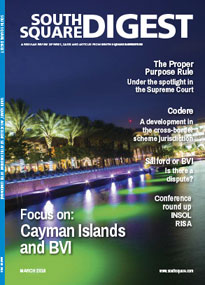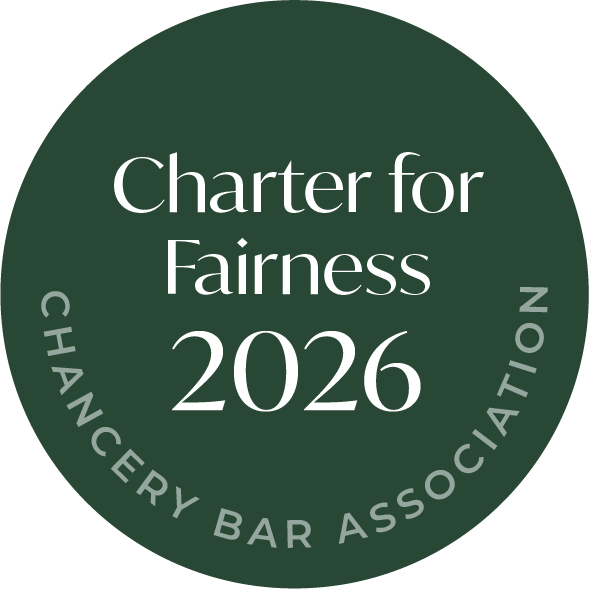

David Allison QC and Ryan Perkins consider the latest episode in the developing jurisprudence on cross-border schemes of arrangement
In December 2015, Newey J sanctioned a scheme of arrangement promulgated by Codere Finance (UK) Limited: [2015] EWHC 3778 (Ch). The scheme formed part of a wider restructuring of the Codere group,and had significant cross-border features. In particular: the group carried on business in Latin America,Italy and Spain (but not in England);the scheme liabilities were governed by New York law; and the scheme company became a co-obligor of the scheme liabilities for the sole purpose of promulgating the scheme and engaging the jurisdiction of the English court. These factors did not dissuade Newey J from sanctioning the scheme. In his judgment, Newey J described the scheme as an example of “good forum shopping”.This article explains the main features of the Codere scheme, and considers the impact of Newey J’s judgment on future cross-border schemes of arrangement. This article also considers the reasons why the court was satisfied that it was appropriate to convene a single meeting of the scheme creditors,notwithstanding that certain creditors received significant fees for backstopping the new money to be raised pursuant to the scheme and additional director nomination rights under the scheme.
Background
The Codere group carried on business by way of gaming and similar activities in Latin America, Italy and Spain. Codere SA, a company incorporated in Spain, was the ultimate holding company of the Codere group. The group’s main sources of finance consisted of a senior facilities agreement and, more importantly for present purposes, two series of notes. The issuer of the notes was Codere Finance (Luxembourg) SA (“Codere Lux”),a subsidiary of Codere SA. Codere SA and several of the key operating subsidiaries of the group acted as guarantors of Codere Lux’s obligations under the notes. The notes were governed by New York law, but were subject to an intercreditor agreement governed by English law. By the time of the scheme,over EUR 1.46bn was due in respect of the notes.Following a payment default on the notes in 2013, the group entered into restructuring negotiations with its noteholders. The parties gave extensive consideration to the restructuring mechanisms available in the jurisdictions where the group carried on business. It was concluded,however, that the available options would all involve formal insolvency proceedings in respect of one or more group companies. This created a significant problem. The group held gaming licences in a number of jurisdictions, which were liable to be terminated upon the commencement of formal insolvency proceedings. The termination of the gaming licences would have been fatal to the group’s business.Schemes of arrangement are not normally regarded as formal insolvency proceedings: there is no statutory stay on enforcement action against the scheme company, there is no requirement for the scheme company to be insolvent (or on the verge of insolvency), and the scheme jurisdiction arises under company legislation rather than insolvency legislation. As a result, it was believed that the implementation of a scheme would not threaten the continued existence of the Codere group’s gaming licences. It was for this reason that the group decided, in close consultation with its creditors, to formulate a scheme of arrangement. The object of the scheme (within the wider context of the restructuring of which the scheme formed a part) was to replace the existing notes with new notes and to effect a partial debt-for-equity swap. When the restructuring negotiations began in 2013, none of the companies in the Codere group were incorporated in England. In itself, this did not create a problem of jurisdiction: the court has jurisdiction to sanction a scheme in respect of “any company liable to be wound up under the Insolvency Act 1986” (section 895(2) CA 2006), which includes foreign companies. However, where a scheme is proposed by a foreign company, the court will not exercise its discretion to sanction the scheme unless there is a sufficient connection with England: see Re Drax Holdings Ltd [2004] 1 WLR (Lawrence Collins J) and Re Magyar BV [2014] BCC 448 at [14] (David Richards J). Given that: (i) none of the existing group companies were incorporated in England; (ii) no group companies had their COMI in England or carried on business in England; and (iii) none of the notes were governed by English law, there was believed to be a risk that a sufficient connection to England could not be established.To deal with this problem, a number of strategies were explored. Ultimately, it was decided that Codere SA would acquire an English SPV known as Codere Finance (UK) Limited (“Codere UK”). Codere SA caused Codere UK to accede to the notes as a “co-issuer” thereof,pursuant to the terms of the indentures governing the notes. By virtue of this accession, Codere UK assumed primary, joint and several liability for all of Codere Lux’s obligations in respect of the notes.The sole purpose of acquiring Codere UK, and of causing Codere UK to accede to the notes as a co-issuer, was to engage the scheme jurisdiction of the English court. It was Codere UK,rather than any of the other group companies, which formally proposed the scheme. The use of an English company was designed to forestall any argument that the scheme company lacked a sufficient connection to the jurisdiction. The scheme provided for the release of all group companies (including Codere UK, Codere Lux, Codere SA and the operating subsidiary guarantors) from their obligations in respect of the existing notes. It is well-established that a scheme of arrangement can release third party liabilities where this is necessary to give effect to the scheme:see Re Lehman Brothers International(Europe) (No. 2) [2010] Bus LR 489 at [65] (Patten LJ); Re La Seda de Barcelona [2010] EWHC 1364 (Ch) at [20]-[22] (Proudman J); and Re Magyar Telecom BV [2014] BCC 448 at [33] (David Richards J). In return for the cancellation of the existing notes, scheme creditors received a complex basket of scheme consideration,consisting of new notes and equity in the group.The commercial terms of the scheme were complex, and are largely irrelevant for present purposes. It is significant, however, that the terms and structure of the scheme were approved by over 97% of the scheme creditors, who entered into lock-up agreements with the scheme company. The remaining creditors were not “hold-outs”, but were simply beneficial holders of the notes who could not be identified, or who had not responded to communications from Codere UK through the clearing systems. It is also significant that about 22% of the scheme creditors by value were domiciled in England. Codere UK filed expert evidence that the scheme (including the third party releases) would be recognised under New York law, pursuant to Chapter 15 of the US Bankruptcy Code. Given that the notes were governed by New York law, expert evidence of this nature was essential to establish that the scheme would achieve its purpose: see Re Magyar Telecom BV [2014] BCC 448 at [16] (David Richards J). Unlike in Magyar, recognition under Chapter 15 was stipulated as a non-waivable condition precedent to the effectiveness of the scheme. Codere UK also filed expert evidence that the scheme would be recognised in Luxembourg (where Codere Lux was incorporated) and all of the jurisdictions where the guarantors carried on business.Finally, Codere UK filed evidence that the only real alternative to the scheme was a formal insolvency process, which would result in a projected return of nil for the scheme creditors (compared to a minimum projected return of 47% under the scheme). At the convening hearing (before Nugee J), Codere UK argued that the scheme creditors formed a single class, such that a single scheme meeting of the scheme creditors should be convened. Nugee J accepted this submission: see [2015] EWHC 3206. Under the terms of the scheme, there were various differences between the treatment of certain scheme creditors. However, Nugee J accepted that the differences were not so great as to fracture the cohort ofscheme creditors into different classes. The most interesting class issues concerned director nomination rights and backstopping fees. (i) Director nomination rights The scheme consideration included an allotment of equity in the ultimate holding company of the Codere group. If a scheme creditor received a sufficient allotment of equity, that creditor would be entitled (pursuant to the terms of shareholders’agreement to be entered into under the scheme) to nominate certain directors to the board of the group’s ultimate holding company (in proportion to their holdings of notes). Based on information available to Codere UK, it was possible to identify the expected recipients of director nomination rights. Codere UK accepted that the director nomination rights could be regarded as a difference in the rights conferred on scheme creditors under the scheme. However, Codere UK contended that this difference was not so great as to make it “impossible for [the scheme creditors] to consult together with a view to their common interest”: per Sovereign Life Assurance v Dodd [1892] 2 QB 573 at 583 (Bowen LJ). Codere UK relied on Re Cooperative Bank plc [2013] EWHC 4072 (Ch) at [27]-[28] (Hildyard J) and Re Telewest Communications plc [2004] EWHC 924 (Ch) (David Richards J), in which the court held that one-off director nomination rights did not create a separate class of those who were able to exercise such rights. The Judge was also referred to Re Stemcor Trade Finance Ltd [2015] EWHC 2662 (Ch) at [21]-[22], in which Snowden J suggested (without deciding the point) that a scheme which conferred the right to appoint executive directors on certain scheme creditors could give rise to a class division. However, Snowden J also said that the right to appoint a nonexecutive director would be unlikely to give rise to a class division: “It seems to me that, although this might be said to constitute a difference in rights available to those lenders under the scheme, those rights of participation in management are limited. They are also not accompanied by any prospect of financial reward. Having regard to the issues to be considered in relation to the scheme overall, in my judgment such rights are not sufficiently different so as to require the putative holders of those rights to be placed into a different class from other lenders who will not ultimately enjoy those rights. I was also told that only two of the Scheme Creditors are likely to qualify to exercise such rights, and I would have had substantial reservations as to whether it was appropriate to constitute such a small class with potential veto rights: see Hawk Insurance [2001] 2 BCLC 480 at [32]-[33].” Codere UK submitted that the rights conferred by its scheme were more analogous to the second set of more limited rights in Stemcor than the rights which caused Snowden J concern. Nugee J accepted this argument, and convened a single scheme meeting. However, he stated that the point was not an easy one: see the convening judgment at [2]. On the facts of Codere, it is suggested that Nugee J reached the correct decision. The starting point is that classes should not be proliferated beyond necessity, “lest by ordering separate meetings the court gives a veto to a minority group” (per Chadwick LJ in Re Hawk Insurance Co Ltd [2002] BCC 300 at [33]). The director nomination rights did not make it impossible for all of the scheme creditors to consult together with a view to their common interest. Indeed, this is apparent (with the benefit of hindsight) from the fact that the scheme was ultimately approved by all of the scheme creditors who voted at the meeting: see below. In future cases, however, the impact of awarding director nomination rights to a limited class of creditors remains somewhat uncertain. Codere, Co-Op and Telewest illustrate that such rights will not necessarily give rise to a class division, but Stemcor illustrates that the matter may be highly fact-specific. (ii) Backstopping fees Under the wider restructuring of which the scheme formed a part, Codere UK sought new monies from its creditors (in return for various new securities). In order to be certain that the necessary amount of new monies would be provided, it is normal market practice for one or more persons to underwrite (or “backstop”) the subscription of the new securities. The underwriters (or “backstop providers”) will invariably receive a fee for providing this service. In Codere, certain of the scheme creditors agreed to act as backstop providers. In return, they received consideration by way of a cash premium ranging from 2% to 5% of the relevant backstopped securities, as well as up to 10% of the equity in the ultimate holding company of the group. Codere UK adduced evidence to demonstrate that the fees should be regarded as a fair market rate. Codere UK contended, and Nugee J accepted, that these backstopping arrangements did not give rise to a class issue which fractured the single class of scheme creditors. Nugee J observed that the backstopping fees were de minimis in comparison to the total scheme liabilities: see the convening judgment at [3]. It is suggested that Nugee J’s analysis on this point is correct. The court has consistently held that underwriting fees at a fair market rate do not create class issues: see e.g. Re Co-Operative Bank plc [2013] EWHC 4072 (Ch) at [23]-[26] (Hildyard J). It is very common for restructurings to involve the raising of new money, and it would be undesirable if this practice gave rise to class issues in schemes of arrangement. Codere illustrates that the sensible approach in Co-Op is likely to be followed in future cases. (iii) Jurisdiction Although Nugee J accepted Codere UK’s submissions on class composition, he was concerned by the cross-border aspects of the scheme. Nugee J said ([at [7]-[9] of the convening judgment): “I will just very briefly, for the benefit of whoever hears the sanction hearing, say that what strikes me as, on the face of it, slightly novel, so far as I am aware, is that this is a group of companies with a Spanish holding company and operating companies trading in Europe and Latin America with no apparent connection with the UK before the restructuring took place, apart from a fact which I regard as of not great significance in this context, which is that an intercreditor agreement was governed by English law. The notes which are sought to be restructured are obligations of a Luxembourg company. They are obligations governed by New York law, and it is clear from the evidence that the connection with the UK has been brought about deliberately by the acquisition of the scheme company as a UK company, the UK company then accepting liability as a co-obligor under the New York governed notes, and then the UK company seeking a restructuring, which will have the effect, it is suggested, of not only restructuring the UK company’s liabilities, but also the Luxembourg company’s liabilities and the guarantee liabilities of other companies within the group. That seems to me, at first blush, to be quite an extreme form of forum shopping, in which the restructuring is brought in the UK purely by incorporating a company to take on very large liabilities. I did raise the question of how the directors of the UK company could regard it as in the interests of their company to take on such large liabilities, to which Mr. Allison gave the answer that, since the company was not insolvent, its interests were to be aligned with those of its principal shareholder, which was the holding company. I regard all these matters as giving rise to quite serious issues which should be looked at at the sanction hearing, without any encouragement from the fact that I have made a convening order, to be taken as to whether I regard this as an appropriate case for a scheme to be sanctioned or not.” Nugee J did not suggest that Codere UK lacked a sufficient connection to England. Given that Codere UK was incorporated in England, the question of sufficient connection did not strictly arise. However, Nugee J was concerned that the scheme involved an “extreme form of forum shopping”, which could lead the court to refuse to sanction the scheme in the exercise of its general discretion. The sanction hearing The scheme was unanimously approved by all of the noteholders who voted at the scheme meeting (representing, in aggregate, more than 97% of the scheme creditors by value). Nearly all of the scheme creditors wrote letters to the English court voluntarily submitting to its jurisdiction. In the absence of any opposition to the fairness of the scheme, the only live issue at the sanction hearing (before Newey J) was whether the court itself was willing to exercise its discretion to sanction the scheme. Codere UK contended that the concerns expressed by Nugee J at the convening hearing should not deter the court from sanctioning the scheme. Codere UK was supported by an ad hoc committee of scheme creditors, who appeared by counsel at the sanction hearing. Newey J accepted Codere UK’s argument, and duly sanctioned the scheme: see [2015] EWHC 3778 (Ch). In the sanction judgment at [16], Newey J noted that the Codere group had a number of connections with England: “I have referred already to the intercreditor agreement dating back to 2005 which, as I have said, is governed by English law. I have mentioned, too, the fact that a significant percentage of the noteholders are domiciled in England, and it is noteworthy too that some 97 percent of the noteholders by value have now submitted to the jurisdiction of the English court. On top of those features, it can be said that the note trustee and security trustee have, since the notes were issued, performed their functions from offices in London and that other relevant documents, including for example the lock-up agreements which have been entered into, are also governed by English law. In the circumstances, the fact that the company is incorporated in England is not the only connection with this jurisdiction.” Further (and in any event), Newey J noted that “the authorities show that over recent years the English courts have become comfortable with exercising the scheme jurisdiction in relation to companies which have not had longstanding connections with this jurisdiction”: see the sanction judgment at [17]. The Judge referred to a number of authorities, some of which are set out below, and concluded: “In a sense, of course … what is sought to be achieved in the present case, is forum shopping. Debtors are seeking to give the English court jurisdiction so that they can take advantage of the scheme jurisdiction available here and which is not widely available, if available at all, elsewhere. Plainly forum shopping can be undesirable. That can potentially be so, for example, where a debtor seeks to move his COMI with a view to taking advantage of a more favourable bankruptcy regime and so escaping his debts. In cases such as the present, however, what is being attempted is to achieve a position where resort can be had to the law of a particular jurisdiction, not in order to evade debts but rather with a view to achieving the best possible outcome for creditors. If in those circumstances it is appropriate to speak of forum shopping at all, it must be on the basis that there can sometimes be good forum shopping. In the particular circumstances of this case, I cannot see that the fact that the company has been acquired only recently, and with a view to invoking the scheme jurisdiction, should cause me, in the exercise of my discretion, to decline to sanction the scheme. For reasons I have already touched on, the scheme appears to be very much in the interests of the group’s creditors. I bear in mind in that context the fact that it was devised following close consultation with creditors; the overwhelming level of support that it has enjoyed from creditors; the fact that no creditor has opposed the scheme; the lack of alternatives available to the group in other jurisdictions; and the fact that, on the evidence, my declining to sanction the scheme could cause the group and its creditors a loss of value of around EUR 600 million, by any standards a large sum.” This passage is significant because it recognises, perhaps more clearly than any of the other cases on cross-border schemes of arrangement, that there is nothing wrong with “forum shopping” which is done “with a view to achieving the best possible outcome for creditors”. In such cases, “if it is appropriate to speak of forum shopping at all, it must be on the basis that there can sometimes be good forum shopping”. It is suggested that Newey J was correct to sanction the scheme, and that he was right to distinguish between good forum shopping and bad forum shopping. There is a world of difference between a case where a German dentist attempts to make himself bankrupt under English law following a bogus COMI-shift in order to escape his lawful debts, and a case where a company elects to pursue a restructuring in a jurisdiction with suitable laws, in consultation with its creditors and for their exclusive benefit. The distinction between good forum shopping and bad forum shopping is well-established in the case law of the CJEU: see the Opinion of AG Colomer in Case C-1/04, Staubitz Schreiber [2006] ECR I-701 at [70]-[73], and the Opinion of AG Colomer in Case C339/07, Seagon v Deko Marty Belgium NV [2009] ECR I-1767 at footnote 49. In the context of schemes of arrangement, the weight of academic opinion also supports the view that forum shopping is generally to be encouraged rather than discouraged: see Payne, “Cross-Border Schemes of Arrangement and Forum Shopping” (2013) 4 European Business Organization Law Review 563 at 586-588. Outside the context of insolvency and restructuring, the distinction between good forum shopping and bad forum shopping is wellestablished. As Lord Simon of Glaisdale said in The Atlantic Star [1974] AC 436 at 471: “Forum-shopping is a dirty word; but is only a pejorative way of saying that, if you offer a plaintiff a choice of jurisdiction, he will naturally choose the one in which he thinks his case can be most favourably presented: this should be a matter neither for surprise nor indignation.” Or as Lord Denning memorably said in the Court of Appeal (The Atlantic Star [1973] 1 QB 364 at 381-2): “No one who comes to these courts asking for justice should come in vain … This right to come here is not confined to Englishmen. It extends to any friendly foreigner. He can seek the aid of our courts if he desires to do so. You may call this ‘forumshopping’ if you please, but if the forum is England, it is good place to shop in, both for the quality of the goods and the speed of service.” The court has sanctioned numerous schemes of arrangement in respect of liabilities governed by foreign law. Examples include Re PT Garuda Indonesia [2001] EWCA 1696 (approving the decision of Lloyd J at first instance); Re Telewest Communications plc [2004] BCC 342 (David Richards J); Re Gallery Capital SA (unreported judgment dated 21 April 2010) (Norris J); Re Magyar Telecom BV [2014] BCC 448 (David Richards J); Re Zlomrex International Finance SA [2015] 1 BCLC 369 (Mann J); and Re New World Resources NV [2015] BCC 47 (Norris J). In each of the more recent cases, the foreign governed liabilities were owed by a foreign-incorporated entity which had shifted its COMI to England for the sole purpose of utilising the scheme jurisdiction. (In PT Garuda, the scheme company was based in Indonesia and had not even shifted its COMI to England.) Further, it is not necessarily abusive or unjustifiable for a company to assume liabilities for the sole purpose of using restructuring or insolvency proceedings available under English law. Numerous cases can be cited in support of this proposition. Perhaps the most significant authority, to which Newey J referred in the sanction judgment at [17], is the decision of Norris J in Re AI Scheme Ltd, reported at [2015] EWHC 1233 (Ch) (convening judgment) and [2015] EWHC 2038 (Ch) (sanction judgment). In that case, a scheme was proposed in order to provide compensation to customers of the Affinion Group, a supplier of consumer credit products. One of the group companies, known as Affinion International Limited, was the main entity liable for the mis-selling claims, but did not wish to propose the scheme itself (which would have triggered an event of default under its financing documents). Instead, the scheme was proposed by an “orphan vehicle” incorporated in England for the sole purpose of promulgating the scheme. The scheme company executed a deed poll, whereby it unilaterally covenanted to become a co-obligor in respect of mis-selling liabilities owing by Affinion International Limited and its “business partners”. The scheme provided for a compromise of those liabilities, both as against the scheme company and as against third parties (including Affinion International Limited and its business partners). Norris J recognised that the scheme company had been deliberately incorporated for the sole purpose of assuming liabilities as a co-obligor, which would then be compromised under the scheme. This did not, however, create a jurisdictional difficulty. In the convening judgment at [26], Norris J said: “The scheme company is, as I have said, a ‘company’ proposing an ‘arrangement’ with its creditors within section 895, and there is no reason to read into that section some limitation to exclude entities such as the scheme company. The structure has not been created as a matter of mere artifice; it has a solid grounding in commercial necessity. I therefore hold that the proposed scheme is one within the section, in relation to which I can order convening meetings.” Nor did the structure create difficulties of discretion: the scheme was later sanctioned by the same Judge. There is clearly a close parallel between AI Scheme Ltd and Codere, as Newey J recognised in the Codere sanction judgment at [17]. There are several other cases in which a company has deliberately assumed liabilities for the purpose of using restructuring or insolvency proceedings under English law, including Re Privatbank [2015] EWHC 3186 (Ch) (Asplin J) and [2015] EWHC 3299 (Ch) (David Richards J); Re Christophorus 3 Ltd [2014] EWHC 1162 (Ch) (Henderson J); and Sompo Insurance Inc v Transfercom Ltd [2007] EWHC 146 (Ch) (David Richards J). During the sanction hearing in Codere, Newey J was referred to numerous other schemes involving various forms of “forum shopping” which were sanctioned by the court. Perhaps the leading case of this type is Re Apcoa Parking Holdings GmbH [2015] BCC 142. The Apcoa scheme involved the compromise of liabilities under a facility agreement which had, at all material times prior to the launch of the scheme, been governed by German law and subject to the jurisdiction of the German courts. The governing law of the scheme liabilities was changed to English law and the jurisdiction clause was changed to the English courts for the sole purpose of creating a sufficient connection to England. The opposing scheme creditor argued that the change of governing law amounted to little more than abusive forum-shopping (see the judgment at [223] and [236]). The court rejected these arguments and sanctioned the scheme. Hildyard J held that it was not abusive to change the governing law of the scheme liabilities to English law for the sole purpose of establishing a sufficient connection with the jurisdiction, especially where there is no viable alternative procedure to a scheme in England which would avoid insolvency proceedings in respect of the group: see the judgment at [244]. Apcoa was applied and approved by Rose J in Re DTEK Finance BV [2015] EWHC 1164 (Ch). Each of the COMI-shifting cases cited above also involved “forum shopping”, yet this did not create any difficulties. Forum shopping via COMI-shifting is also a common phenomenon in the context of administration: see Re Hellas Telecommunications (Luxembourg) II SCA [2010] BC 295 and Re European Directories (DH6) BV [2012] BCC 46. In Re PT Garuda Indonesia (unreported judgment dated 4 October 2001; affirmed on appeal, [2001] EWCA Civ 1696), Lloyd J sanctioned a scheme of arrangement proposed by a state-owned Indonesian company to compromise claims including liabilities governed by Indonesian law. On any view, the scheme company’s connections with England were minimal: it had not even shifted its COMI from Indonesia to England. Lloyd J nevertheless said: “As regards the choice of proceeding in England and Singapore and not in Indonesia, that too is a rational commercial decision, justifiable by reference to objective factors described in the Explanatory Statement. Of course one would normally expect a corporate entity to look first to the law of the place of its incorporation … but if that law, for whatever reason, does not provide a procedure that seems likely to meet the needs of the Company according to the board’s best judgment, the Company cannot be criticised for having recourse to another jurisdiction and law available to it if that offers the possibility of achieving the desired result in a sensible way.” Ultimately, there is no fundamental distinction between the forum shopping in Codere and the forum shopping in numerous other schemes which the court has sanctioned in recent years. Newey J’s analysis was therefore correct. Conclusion Codere is an important step in the fast-developing jurisprudence relating to cross-border schemes of arrangement. It should be emphasised, however, that a similar strategy may not be effective in all cases. It cannot be assumed that a group with no connection to England can promulgate a scheme of arrangement simply by incorporating a new company, causing the new company to execute a deed poll (or similar) such that it becomes a co-obligor in respect of the relevant liabilities, and causing the new company to propose a scheme which provides for the release of the relevant liabilities as against the entire group. This strategy was successful in Codere because: (i) the scheme was designed in close consultation with creditors; (ii) the scheme was unanimously approved by all of the scheme creditors who voted at the meeting (representing more than 97% of the noteholders by value), most of whom voluntarily wrote letters submitting to the jurisdiction of the court; (iii) it was clear, on the basis of expert evidence, that the scheme would be recognised in all relevant jurisdictions, and recognition in New York was a nonwaivable condition precedent to the implementation of the scheme; (iv) it was clear, on the basis of expert evidence, that there was no alternative to the scheme under the law of any jurisdiction which would benefit the creditors as a whole; and (v) there were a number of preexisting connections to England, including a large number of creditors domiciled in England and an English intercreditor deed. Without the above ingredients, it is uncertain whether the Codere strategy would have succeeded. If it were always possible for a group with no connection to England to promulgate a scheme of arrangement simply by incorporating a new company, causing the new company to execute a deed poll (or similar) such that it becomes a co-obligor in respect of the relevant liabilities, and causing the new company to propose a scheme which provides for the release of the relevant liabilities as against the entire group, then it is arguable that the “sufficient connection” test would be deprived of any meaningful application. Accordingly, care should be taken in structuring future schemes in this manner.
David Allison QC, Richard Fisher and Ryan Perkins appeared for Codere UK; Antony Zacaroli QC and Charlotte Cooke appeared for the Ad Hoc Committee








![Brake & Anor v The Chedington Court Estate Ltd [2023] UKSC 29](https://southsquare.com/wp-content/uploads/2024/02/Brake-Anor-scaled-e1728649908896.jpeg)









![NEW DECISION OF THE COURT OF APPEAL – Midland Premier Properties Ltd & Anor v Doal & Ors [2026]](https://southsquare.com/wp-content/uploads/2025/06/matthew-henry-VviFtDJakYk-unsplash-scaled-e1750083975207.jpg)